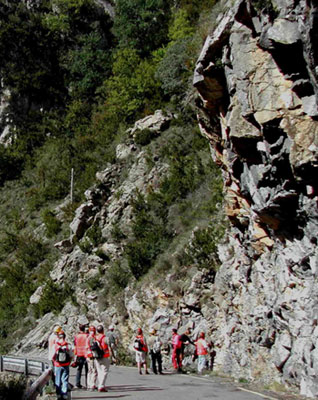
- Always remember that field activities are dangerous. The outcrops that we want to study (cliffs, stone quarries, etc.) are inherently hazardous areas.
- Be well-equipped, especially in case of storms, physical effort, extreme temperatures, etc.
- Tell somebody where you go for the field activity, especially if you go alone and to uninhabited or remote areas. Take your mobile phone always with you.
- Use a helmet if you work in places of rockfalls (cliffs, pronounced escarpment, mines, stone quarries, etc.) Remember that they can suddenly fall although it is more frequent during and after storms and frosts.
- If you have to work in outcrops next to roads (particularly in case of heavy traffic) a reflective jacket and signs will be very useful.
- Ask for permission if you want to enter a private property to get in. This is particularly important when it is specified that it is forbidden to go through some ways. In the case of open or subterranean mining apart from the formal permission you will have to inform the mining office (danger of blasting, etc.)
- You must be respectful with exclosures and electric fence for livestock.
- Be careful with dogs that survey private properties. As law says they would have to be tied but very often they are not. Normally they won't be aggressive so if they go close to you try to be calm and only assault them if they attack you (remember that you have a hammer.)
- Be respectful with outcrops. Do not damage or draw on them if it is not necessary. If you must write numbers on the rock or take samples, do it discretionally.
- Use the hammer sparingly -especially in frequented areas- and do not use it sites of special geological interest. Remember that small pieces of rock can fall because of the use of the hammer and that it can be dangerous. If necessary, use protective glasses or goggles.
- Field activities in unknown places can have some hidden risks (flood currents may cut off you in coast escarpments, sudden river or brook rises, etc.) Take advice from the inhabitants of the area.
- People with any disease or important indisposition (people with asthma, cardiac problems, vertigo, etc.) must notify it to the responsible person.
- Be careful if you take your car with you to the fieldtrip. It is very dangerous to drive for long distances if you are tired and through roads that you don't know well.
This text was adapted and modified from the 'code for geological fieldwork' of the Geological Society of London and 'security in geologic field trips' of Southampton University.
